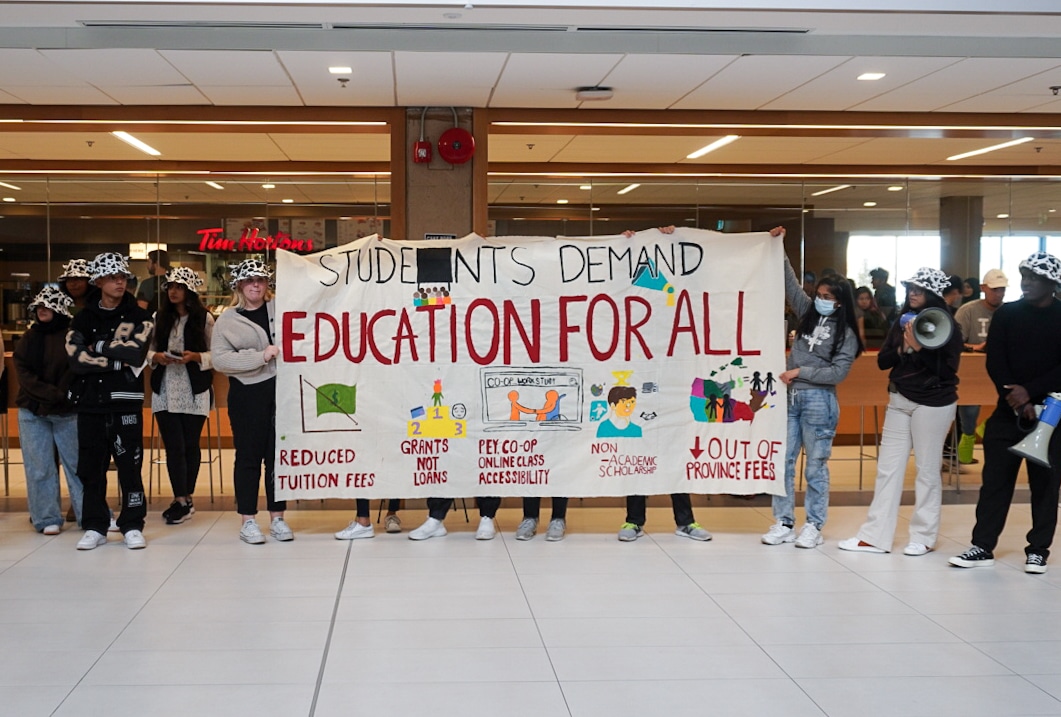“Education for All”: Why university “should be a right, and not a privilege”
The UTMSU calls for free and accessible education for all undergraduate students as part of its ongoing “Education for All” campaign.
On October 24, 2022, the University of Toronto Mississauga Students’ Union’s (UTMSU) executive team, adorned with cow-printed bucket hats, loudly marched down the halls of the William G. Davis building, dropping their “Education for All” banner as the inaugural gesture for their namesake campaign. “Students are not cash cows and should not be treated as such,” exclaimed UTMSU President Maëlis Barre through a megaphone.
Barre shared with the students dining in the food court that “during the pandemic, we have seen an increase in tuition fees for international students by five point four per cent, […] and three per cent for out-of-province students, which is shameful.” She expressed that education “should be a right, and not a privilege.”
The UTMSU began lobbying the “Education for All” campaign, also known as the “Fight the Fees” campaign, in 2020. The campaign, originally launched by the CFS and adopted by the UTMSU, addresses educational and financial barriers experienced by current and future undergraduate students at the university. In a conversation with The Medium, Alistair Kirk, the vice-president external for the UTMSU and the Ontario International Students Representative for the CFS, describes the “Education for All” campaign as a “long-term” project—one of three he is in charge of.
In 2020, the initial lobby document, resulting from campaign efforts, outlined seven demands to the university administration. Demands included the immediate reduction of tuition fees, additional scholarships and awards, and the improvement of accessibility services, among others. The year’s end saw the resolution of one demand—departmental, stand-alone mental health counsellors—a tangible win for the UTMSU.
Kirk acknowledges that the bigger asks “take time.” Regarding the goal of reducing tuition fees for the university’s undergraduate students, Kirk says, “We know that there is going to be a lot of resistance to a goal like this,” especially considering the provincial and federal changes needed.
In early 2023, after collecting feedback from students through a survey, the UTMSU will lobby members of the governing council, academic and administrative departments, and the dean, to potentially realize their goals. Kirk describes their current action plan to follow an “educate, agitate, and organize” structure—the next few months will propel the campaign forward through the first two strategies.
In the aftermath of the Covid-19 pandemic, the “Education for All” campaign’s goals were revised to a total of five demands, including three long-term and two short-term aspirations. In the long-term, the UTMSU hopes the campaign efforts will reduce and gradually eliminate tuition fees for all students, convert loans into grants, and abolish out-of-province tuition increases. Kirk realizes that these goals may be realized outside his tenure as vice-president external, stating, “The reason we continuously advocate for demands like these is because if we don’t continue the conversation, we can’t inspire the next generation to do this work.”
The UTMSU’s first and most ambitious goal, is exemplified in nations where post-secondary education is free to its citizens—namely Finland, Denmark, Norway, and Germany, for example. Kirk also highlights a domestic example stating: “In Newfoundland and Labrador, in 2015, [the provincial government] decided that all outstanding debts of students were going to be paid off from 2015 t0 2019, which only cost them 0.035 per cent of their [annual gross domestic product].” Kirk emphasizes that “free education” does not mean that incidental fees such as textbooks and amenities would be eliminated—instead, this amount would be “accessible and bearable to students, without recurring interest.”
In the short term, the “Education for All” campaign hopes to increase paid experiential learning and co-op opportunities, provide online course delivery options, improve accessibility services, and lastly, increase non-academic scholarships, especially for Black and Indigenous students.
With support from the other two campus students’ unions, and the part-time and graduate students’ unions, Kirk hopes this developing coalition of shared goals and problems will allow for greater change at the institutional level. Kirk also encourages students to get involved by attending monthly commission meetings advertised on the UTMSU’s social media.
Reflecting on the ease of access to education in other countries, Kirk concludes, “So what makes Canada different? I think we should aspire to reach that level if we see ourselves as a leader of the world.”

